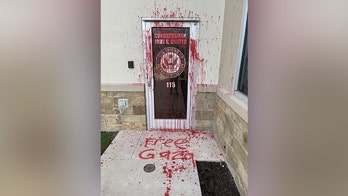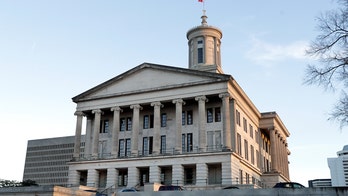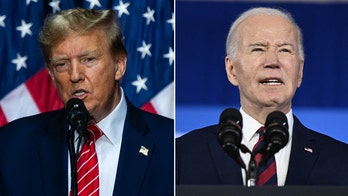White House Press Secretary Robert Gibbs has scaled back his on-camera daily briefing schedule compared to last year and also has only given 10 of them in October and November combined.
His last and only on-camera briefing at the White House this month was November 4. Gibbs had one briefing in front of cameras on the president's recent Asia trip that included a couple of other senior advisers also answering questions.
"I think they may just want to lay low with him," says Pulitzer Prize winner and media critic Dorothy Rabinowitz, who is also is a member of the editorial board of The Wall Street Journal.
"Gibbs has been a huge problem for the administration," referring to a series of comments that Gibbs' made recently in various media venues and had to back track. His statements included slamming the what he called the "professional left" and angering Speaker Pelosi with a summer prediction that Democrats were likely to lose the House.
The president was in Asia for 10 days in November and spent several days campaigning across the country before the midterm elections.
White House press secretaries typically do not brief as much while the president is traveling, especially while abroad. However it is unclear exactly why there haven't been more regular on-camera briefings while the administration has been in town and at the White House.
Media access and reporters pushing for more opportunities for information is nothing new, but this White House press office appears to have taken to a new strategy, possibly thinking that offering the president to media outlets of their choosing might trump the need to give briefings.
President Obama has given several interviews to radio outlets and CBS' 60 Minutes in recent weeks. He'll also talk to NBC for a Thanksgiving special.
When asked Thursday at an on-the-record but off-camera briefing why there had not been any on-camera pressers this week while they were in town, Gibbs said there was "no reason."
He added that he wanted the president doing the speaking on the news about events of the day including the update on the nuclear arms treaty (also called START) and General Motors returning to private ownership.
The White House added an on-camera statement by the president in the afternoon on GM and Gibbs noted that Obama took questions at the START meeting earlier in the day (which was actually to the press pool, a small representation of the full press corps and not the full set of reporters and agencies).
Gibbs has been giving only a handful of briefings in recent months. He gave seven in October, five in August, and 11 in July. Based on an analysis of materials from the Office of the Federal Register's checklist of White House Press Releases, in 2009 Gibbs gave roughly 149 on-camera briefings along with 45 gaggles. So far this year, he's given around 95 on-camera briefings and 20 gaggles, and with 2010 coming to a close soon and the holidays eating away available briefing days, it seems his tally this year will be significantly less than last year. Gibbs also has recently moved to doing more off-camera "gaggles," in place of a formal on-camera briefing. Gaggles are media-speak for a gathering of reporters with on-the-record, off-camera answers to questions peppered by members of the White House press corps.
The president left for Lisbon, Portugal late Thursday, but Gibbs did not talk to reporters en route.
It's not unusual for the press secretary to deliver off-camera gaggles on Air Force One when the president is traveling. In the beginning of the Obama administration, Robert Gibbs handled the Air Force One gaggles, sometimes granting TV cameras to roll and have the gaggle on-camera, but of late, it's been Deputy Press Secretary Bill Burton handling much of the gaggle duties on domestic trips (off-camera), with Gibbs picking up on the more major and overseas visits.
While the Bush administration had its own issues with media access and perceptions of secrecy, a former White House staffer tells Fox News that by tradition, they tried to hold a gaggle and a briefing every day the president was at White House, except when President Bush gave had a news conference.
In the Bush administration, an off-camera gaggle was not a daily occurrence but it also typically did not preclude an on-camera briefing.
Many days, former Press Secretary Dana Perino, or her predecessor Tony Snow, would hold off-camera gaggles in the morning, to prepare for the day and "take the temperature" of reporters before the on-camera briefing. They did this so they could avoid having to keep saying things like "we'll have to get back to you on that" and could come to briefings with information on questions they knew would likely come up.
The last few months they ended up dwindling it down to one single briefing after they felt the same questions were being asked in both events.
Rabinowitz added she thought the Bush administration had its own issues with Press Secretary Scott Mclellan and that the past few decades have been lacking in top-notch White House flaks.
"Now they're [press secretaries] suddenly degenerated to political appointees who know nothing, no idea why he has this position, in last three administrations the press secretaries have been complete disasters."
By most standards, Gibbs has had a normal, slightly contentious relationship with the press. He did recently stick up for their access to an event on the president's recent trip in India.
Gibbs has been the spokesman for the White House since the start of the Obama presidency, but is widely expected to move into a more advisory role and leave the briefing lectern as the administration begins transitioning new leadership into some key positions. He currently attends some high level meetings in an advisory capacity, a greater presence that is a little unusual for some press secretaries.
The transition of new leaders in key posts are typical of any White House around the two-year mark, but the sense is that the Obama administration could also use a revamp in strategy and staff both in dealing with a boost in GOP members on the Hill and also the usual need for certain staffers to start focusing on the president's 2012 reelection bid.
The Wall Street Journal is owned by the same parent company as Fox News.




